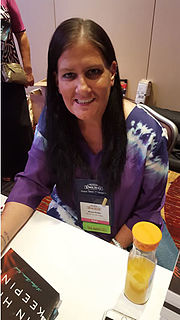A Quote by Sarah Addison Allen
But one thing she [Rachel] did believe in was love. She believed that you could smell it, that you could taste it, that it could change the entire course of your life.
Related Quotes
She got under the covers and put her arms around the bag. She could smell Tibby. It used to be she couldn't smell Tibby's smell in the way you couldn't smell your own; it was too familiar. But tonight she could. This was some living part of Tibby still here and she held on to it. There was more of Tibby with her here and now than in what she had seen in the cold basement room that day.
She wanted happily ever after more than he could possibly know. She wanted forever. Problem was, she just wasn’t sure she believed in it anymore. It was why she clung to her fiction so much. She immersed herself in books because there she could be anyone and it was easy to believe in love and happily ever after
How was it that he haunted her imagination so persistently? What could it be? Why did she care for what he thought, in spite of all her pride in spite of herself? She believed that she could have borne the sense of Almighty displeasure, because He knew all, and could read her penitence, and hear her cries for help in time to come. But Mr.Thornton-why did she tremble, and hide her face in the pillow? What strong feeling had overtaking her at last?
I think that Eleanor Roosevelt really learned about the limits of power and influence from Arthurdale. She could not make some things happen. And she particularly learned that she could not, just because she was nominally in charge, she could not change people's hearts and minds; that a very long process of education would result before race was on the national agenda. And it really did move her into the racial justice arena with both feet. She came out fighting.
I believed even then that if I could transform my experience into poetry I would give it the value and dignity it did not begin to possess on its own. I thought too that if I could write about it I could come to understand it; I believed that if I could understand my life—or at least the part my work played in it—I could embrace it with some degree of joy, an element conspicuously missing from my life.
Love was undoubtedly one of the things capable of changing a person's whole life from one moment to the next. But there's the other side of the coin, the second thing that could make a human being take a totally different course from one he or she had planned; and that was called despair. Yes, perhaps love really could transform someone, but despair did the job more quickly.
One thing I did have under my belt was, my mother lost her mother when she was 11. She mourned her mother her whole life and made my grandmother seem present even though I never met her. I couldn't imagine how my mom could go on but she did, she took care of us, she worked two jobs and had four children. She was such a good example of how to conduct oneself in a time of grief. When I lost my husband, I tried to model myself as much as I could on her.


































